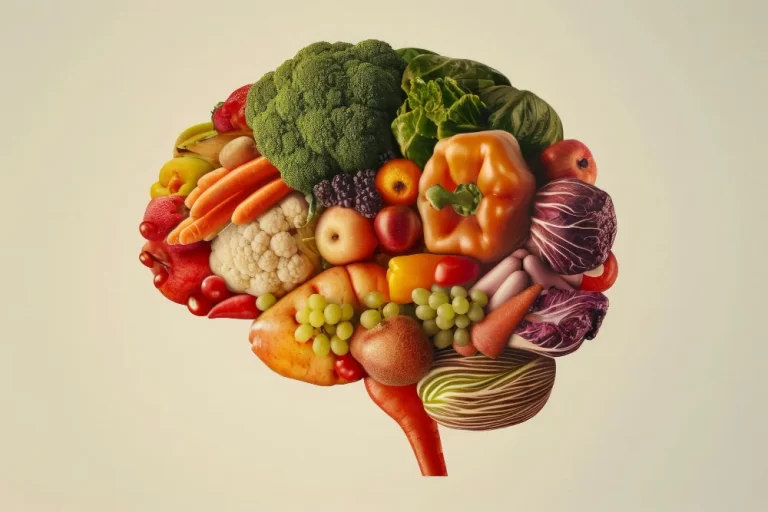Key Points Summary
- Certain nutrients—like omega-3s, B vitamins, antioxidants, and choline—play a central role in memory, focus, and mood.
- Foods such as berries, leafy greens, walnuts, fatty fish, and turmeric show strong evidence of cognitive benefits.
- The gut-brain connection reveals how fermented foods and fiber may enhance mental performance via the microbiome.
- Dietary patterns like the Mediterranean and MIND diets consistently outperform “superfoods” in long-term brain health.
- Research is promising, but not all claims hold up—critical thinking (and smart shopping) matters.
A Better Brain, One Bite at a Time?
You’re standing in the grocery aisle, holding a carton of blueberries in one hand and a bag of walnuts in the other, wondering—can what I eat really make me sharper, calmer, or more focused?
In a world where mental clarity feels like a luxury—foggy mornings, forgotten names, lost keys—the search for a cognitive edge is no longer reserved for biohackers or Silicon Valley execs. It’s become a quiet everyday concern for students, parents, older adults, and anyone trying to stay mentally agile in a distracted world.
Recent research has some compelling answers—and they don’t come in a pill. They’re on your plate.
Why Brain-Friendly Nutrition Matters
Cognitive decline isn’t just something that happens later in life. Even young adults are reporting more trouble with focus, memory lapses, and mental fatigue—what some experts call “digital dementia.” Meanwhile, aging populations face higher risks of neurodegenerative symptoms like Alzheimer’s, often beginning decades before diagnosis.
While genetics and lifestyle habits (like sleep and physical activity) play a big role, what we eat is emerging as a modifiable factor with surprising power over how our brains age—and function day to day.
How Food Affects Your Brain: A Look Inside
The brain may be only 2% of your body weight, but it uses around 20% of your energy intake. That makes it highly sensitive to nutrients and their availability.
Key nutrients linked to better cognitive performance:
- Omega-3 fatty acids (DHA and EPA): These essential fats, found in fatty fish like salmon and sardines, are structural components of brain cell membranes. A 2022 meta-analysis in Nutrients found that DHA supplementation significantly improved attention, memory, and processing speed across multiple age groups (Jiao et al., 2022).
- B vitamins (B6, B9, B12): Crucial for neurotransmitter synthesis and reducing homocysteine, a biomarker linked to neurodegeneration. A review in Nutrients found that B-vitamin-rich diets supported brain volume and slowed cognitive decline (Kennedy, 2016).
- Choline: Needed for acetylcholine synthesis—a neurotransmitter essential for memory and mood regulation. Eggs are a top dietary source. Research in Frontiers in Aging Neuroscience links higher choline intake to better cognitive performance in older adults (Poly et al., 2011).
- Flavonoids & Polyphenols: These plant compounds protect neurons from oxidative stress and may improve blood flow. A 2021 review highlighted the cognitive benefits of berry flavonoids, especially for working memory and executive function (Bell et al., 2021).
Top Brain-Boosting Foods Backed by Science
Here are the foods most consistently associated with brain health benefits in scientific studies:
- Blueberries: Rich in anthocyanins, blueberries have been linked to improved memory and executive function, especially in older adults. A 2019 randomized trial showed improved cognitive performance in just 12 weeks of daily blueberry consumption (Whyte et al., 2019).
- Leafy Greens: Kale, spinach, and Swiss chard are packed with folate, vitamin K, and lutein. A study from Rush University Medical Center found that individuals who consumed one or two servings per day had brains that functioned as if they were 11 years younger (Morris et al., 2018).
- Fatty Fish: Salmon, mackerel, and sardines provide DHA and EPA. Higher omega-3 blood levels have been associated with greater brain volume and better memory in older adults (Tan et al., 2012).
- Walnuts: The only tree nut with significant alpha-linolenic acid (ALA), a plant-based omega-3. A 2020 review linked walnut consumption to improved memory and reduced inflammation markers in aging populations (Arab & Ang, 2020).
- Turmeric (Curcumin): Curcumin crosses the blood-brain barrier and may increase BDNF (a growth factor linked to neuroplasticity). A 2018 study found that daily curcumin improved memory and attention in non-demented adults over 18 months (Small et al., 2018).
- Fermented Foods: Yogurt, kefir, and kimchi support a healthy gut microbiome. These bacteria may influence the brain through the gut-brain axis. A 2023 systematic review found that probiotics significantly improved cognitive function across various studies (Loughman et al., 2023).
- Dark Chocolate: In moderation, dark chocolate has been shown to improve mood and short-term cognitive performance thanks to its flavonoid content (Socci et al., 2017).
The Gut-Brain Axis: A Two-Way Conversation
The gut and brain communicate through the vagus nerve and chemical signals, including serotonin and dopamine—both of which are influenced by gut microbes.
Recent research has shown that diets rich in fermented foods and prebiotic fibers may lower inflammation and improve cognitive flexibility. A randomized study in Nutritional Neuroscience showed improved verbal memory and stress regulation with probiotic use (Tillisch et al., 2013).
Whole Diets Outperform “Superfoods”
Rather than chasing individual ingredients, experts now emphasize entire dietary patterns.
- Mediterranean Diet: High in olive oil, fish, nuts, and vegetables. A 2020 study in The Lancet Neurology linked this diet to a 33% lower risk of Alzheimer’s symptoms (Scarmeas et al., 2006).
- MIND Diet: A blend of the Mediterranean and DASH diets. It emphasizes leafy greens, berries, nuts, and low-sodium foods. Even moderate adherence may reduce cognitive decline by up to 35% (Morris et al., 2015).
- DASH Diet: Focuses on lowering blood pressure through fruits, vegetables, and low-fat dairy. It may benefit memory and processing speed, especially in midlife (Smith et al., 2010).
Don’t Believe Every Headline
While results are encouraging, experts caution that many studies have limitations—small sample sizes, short follow-up periods, and dietary self-reporting. That doesn’t invalidate the science—but it does mean results should be seen as part of a bigger picture.
“Brain fog won’t vanish overnight because you ate a handful of walnuts,” says Dr. Uma Naidoo, nutritional psychiatrist at Harvard Medical School. “But consistent dietary patterns make a profound difference over time.”
Bottom Line: Eat for a Sharper Mind
Building a brain-friendly plate isn’t about exotic powders or miracle snacks. It’s about daily choices—favoring whole foods, rich in color and fiber, with healthy fats and fermented additions. Your brain will thank you—not instantly, but enduringly.
The article does not in any way constitute as medical advice. Please seek consultation with a licensed medical professional before starting any treatment. This website may receive commissions from the links or products mentioned in this article.
Subscribe for Free for more insightful health articles tailored to your needs.
Sources
- Jiao J, et al. Nutrients. 2022. DHA and Cognitive Function
- Kennedy DO. Nutrients. 2016. B Vitamins and the Brain
- Poly C, et al. Frontiers in Aging Neuroscience. 2011. Choline and Cognition
- Bell L, et al. Frontiers in Nutrition. 2021. Berry Flavonoids and Cognition
- Whyte AR, et al. European Journal of Nutrition. 2019. Blueberry Supplementation Trial
- Morris MC, et al. Neurology. 2018. Leafy Greens and Brain Aging
- Tan ZS, et al. Neurology. 2012. Omega-3s and Brain Volume
- Arab L & Ang A. Journal of Nutrition, Health & Aging. 2020. Walnuts and Brain Health
- Small GW, et al. American Journal of Geriatric Psychiatry. 2018. Curcumin and Memory
- Loughman A, et al. Nutritional Neuroscience. 2023. Probiotics and Cognition
- Tillisch K, et al. Gastroenterology. 2013. Gut-Brain Axis Study
- Scarmeas N, et al. Lancet Neurology. 2006. Mediterranean Diet and Alzheimer’s
- Morris MC, et al. Alzheimer’s & Dementia. 2015. MIND Diet Study
- Smith PJ, et al. Hypertension. 2010. DASH Diet and Cognition
Last Updated on August 4, 2025




Love how eating smart can sharpen your mind
Good to know berries and fish help the brain.